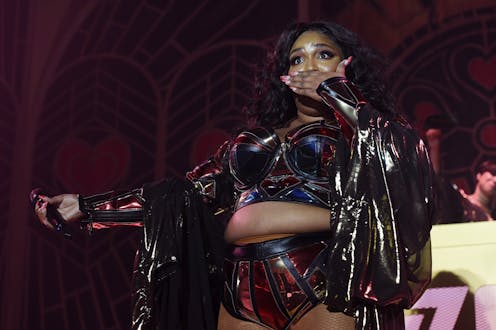The art of a successful celebrity apology
- Written by Sarah Scales, PhD Candidate, Swinburne University of Technology

Less than a week ago, American singer and rapper Lizzo set a new bar for celebrity apologies. Lizzo re-released her latest single GRRRLS[1] after receiving criticism online, due to the first verse in the song containing an ableist slur.
Fans and disability advocates shared their disappointment and hurt over the lyric. On Twitter[2] and TikTok[3] the use of the term and its history as offensive was discussed and dissected. Lizzo tweeted an apologetic statement[4] three days later, receiving high praise.
A celebrity apology acts as a turning point, influencing if and how fans will continue to support them. Done well, a celebrity apology allows their fans to see behind the constructed persona, understand their motivations and view them as genuine.
From Ariana Grande licking a donut[5] and claiming she “hated America”, and Will Smith’s infamous Oscars slap[6], to offensive comments and criminal allegations, we want celebrities to show they are sorry. We demand these statements so frequently that Chris Pratt made a “heartfelt apology[7] for whatever it is he would end up accidentally saying”.
So, why was Lizzo’s apology so effective?
Acknowledge the mistake
An apology is made up of two parts, the first being an acknowledgement. Hugh Grant admitting[8] “[he] did a bad thing and there you have it” is widely considered one of the best, as he owned his arrest and affair.
Lizzo’s reads:
“It’s been brought to my attention there is a harmful word in my new song ‘GRRRLS’. Let me make one thing clear: I never want to promote derogatory language.”
She addresses and admits to her mistake and the hurt caused, in a clear and explicit way. The second sentence of her acknowledgement acts to set the record straight ensuring what we knew of her persona to be true: Lizzo champions acceptance and self-love[9].
Show you’re sorry
The second part of an apology is showing remorse. It indicates the apology is not performative or a box-ticking exercise and communicates genuine regret. For example, Kristen Stewart was “deeply sorry for the hurt and embarrassment [she] caused[10]” over her affair, and Chris Evans “rightfully angered some fans[11]” over his use of offensive language.
Social and political philosopher, Alice MacLachlan argues[12] there are many emotions which can signify remorse. An apology could express “sorrow, shame, or anger […] guilt, sheepish[ness], heartbreak, despair [or] hope”. The emotion conveyed should be suitable to the scandal.
Lizzo shows remorse as empathetic:
“As a fat Black woman in America, I’ve had many hurtful words used against me so I overstand the power words can have (whether intentionally or in my case, unintentionally)”.
Lizzo outlines her motivations were “unintentional”, indicating she was not aware of the words offensive meaning. The lack in knowledge could have been used as an excuse, justification, or a way to avoid blame and responsibility. However Lizzo demonstrated accountability for the hurt she caused fans.
Justifications and excuses are considered a non-apology[13]. Celebrities who use passive and vague language, generate further criticism on top of the scandal. The common phrase, “to anyone who I’ve offended”, implies no remorse and suggests the celebrity does not understand or care about what they are apologising for.
Non-apologies have been uttered by Jennifer Lawrence[14] (“the way it was perceived was not funny”), Jeremy Renner[15] (“it was not meant to be serious”), and Gina Rodriguez[16] to name a few.
Read more: Revisiting Will Smith's slap and what it means to protect a loved one[17]
Make amends
If action does not follow an apology, it can be considered “cheap talk[18]”. Lizzo showcased immediate amends:
I’m proud to say there’s a new version of GRRRLS with a lyric change. This is the result of me listening and taking action.
By re-releasing the single, Lizzo amended her mistake, decreased negative reactions to the original lyric, and maintained her relationship with her fans.
Lizzo then summarised her intentions behind why she apologised[19] stating:
As an influential artist I’m dedicated to being part of the change I’ve been waiting to see in the world.
The reasoning behind her apology aligns with her public values. It appears her intentions were pure, rather than only seeking forgiveness without any growth, learning or making amends.
Finally, Lizzo responded in a timely manner, delivering her apologetic statement three days after offence was caused. Timing an apology correctly and appropriately is a delicate balance. Too soon and the victims have not had enough time to process their hurt, and too late the apology will lose value and meaning.
A good celebrity apology is rare. We are consistently expecting apologies in the hope one day we might see one and this time, Lizzo delivered.
References
- ^ GRRRLS (www.youtube.com)
- ^ Twitter (twitter.com)
- ^ TikTok (www.tiktok.com)
- ^ tweeted an apologetic statement (twitter.com)
- ^ licking a donut (edition.cnn.com)
- ^ infamous Oscars slap (theconversation.com)
- ^ heartfelt apology (www.polygon.com)
- ^ Hugh Grant admitting (www.eonline.com)
- ^ champions acceptance and self-love (www.theguardian.com)
- ^ deeply sorry for the hurt and embarrassment [she] caused (people.com)
- ^ rightfully angered some fans (ew.com)
- ^ Alice MacLachlan argues (www.jstor.org)
- ^ non-apology (www.tandfonline.com)
- ^ by Jennifer Lawrence (abcnews.go.com)
- ^ Jeremy Renner (ew.com)
- ^ Gina Rodriguez (www.vox.com)
- ^ Revisiting Will Smith's slap and what it means to protect a loved one (theconversation.com)
- ^ cheap talk (onlinelibrary.wiley.com)
- ^ why she apologised (muse.jhu.edu)
















